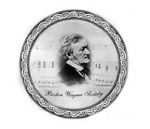Saturday, March 13, 2010
Boston Lyric Opera's "Ariadne auf Naxos"
Thursday, March 11, 2010
"The Unknown Wagner"
His passion for art and architecture stand in equal measure to his love of music, which began in his high school days. His musical credentials include writing record reviews for Fanfare magazine for about five years, reviewing concert performances of the Canton Symphony Orchestra or the local newspaper for five years; he was a preconcert lecturer for both the Akron and Cleveland Orchestras and has been an annual regular with the Canton Symphony. His weekly radio program Classical Curios was presented for a year on WKSU-FM, and he has given numerous lectures throughout the community on aspects of classical music, opera, and ballet. He has taught courses on the history of opera and music appreciation.
Albacete’s interest in the music of Richard Wagner goes back to those early days as well, when he considered this composer’s operatic music—especially the Ring—the ultimate challenge. He “came of age” listening to Solti’s history-making Ring Cycle. Since then he has made his way through all of the Wagner operatic oeuvre many times over. At the Wagner Society of Ohio’s three past symposia, his curiosity was piqued by the fact that no one ad-dressed the “other” music of Wagner. Was there much “other” music, and if so, shouldn’t it deserve our attention too? Thus began his search for recordings of “Der unbekannte Wagner” (The Unknown Wagner). As his collection grew, he received an invitation to present samplings of his discoveries at a meeting of the Wagner Society of Ohio.
The search for CDs was conducted largely via e-mail to all of the usual sources, but a few elusive items required contacts in England, Italy, Germany, Australia, and South Africa. And he is grateful to quite a few friends here and abroad for their efforts in helping him find certain curios. Each selection is introduced with informative narration, arranged chronologically for the most part to reveal the gradual evolution of the composer’s talents. And while every selection will come as a pleasant surprise, some will have the audience wondering why these are not heard more often in the concert hall. The program surveys much of his piano music from the monumental sonatas to the miniature album leaves dedicated to some of Wagner’s “special” friends; we will hear a few cuts from his only complete symphony, plus various excerpts from other orchestral works early and late; there are the choral works written for patriotic, political, and even religious occasions, and songs all along the course of his career, culminat-ing with an emotional final selection. Just in case some listener in the audience wants to hear something NOT included in the program, Albacete plans to bring along the CD collection with him, and, time permitting, he will play one or two additional items or one of his newly discovered gems.
For more information: www.bostonwagnersociety.org; info@bostonwagnersociety.org; 617-323-6088
